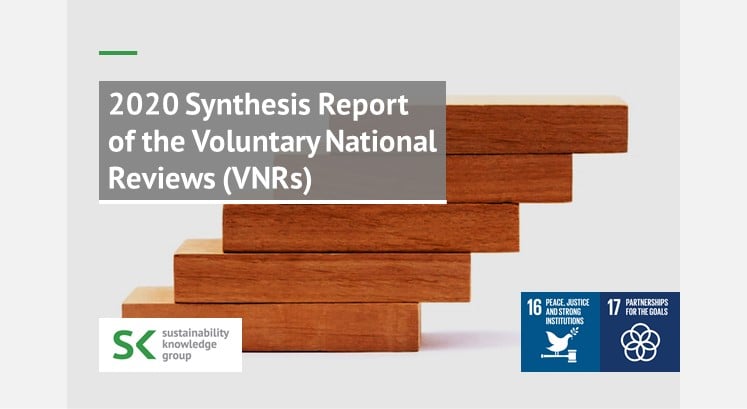Voluntary National Reviews (VNRs) are part of the follow-up and review of the 2030 Agenda for Sustainable Development. The High-Level Political Forum on Sustainable Development (HLPF) under the auspices of the Economic and Social Council (ECOSOC) encourages member states to conduct regular and comprehensive reviews of progress at the national and sub-national levels. VNRs allow an exchange of experiences, successes, challenges, and lessons learned, to accelerate the implementation of the 2030 Agenda. The reports also aim to strengthen government policies and institutions and provide a platform for multi-stakeholder and partnerships for implementing the SDGs.
Progress towards the Sustainable Development Goals
The United Nations released a Voluntary National Review synthesis report (VNRs) that included a review of 47 countries for the year 2020. The reports highlight the challenges due to the COVID-19 pandemic and outline actions and visions around the SDGs.
VNRs showed progress towards the SDGs as follows:
- SDG 1 (No poverty): Many countries have warned that progress towards SDG 1 may stalled or reversed, due to the return of many segments to poverty as a result of the economic fallout of the COVID-19.
- SDG 2 (Zero hunger): Few countries have reported full achievement of SDG 2, while others have articulated their national strategies, plans and frameworks to support agricultural production, reduce land degradation, conserve agricultural biodiversity.
- SDG 3 (Good health and well-being): Many countries have reported measures to accelerate progress towards SDG 3. Some reports also mentioned a decrease in the maternal mortality rate, and children aged five and under. Some countries have also reported decreasing prevalence of tuberculosis and malaria, while non-communicable diseases such as diabetes and obesity continue to increase.
- SDG 4 (Quality education): Almost all countries focused on education, and SDG 4 report progressing this through policies that emphasized ensuring high-quality education for all, especially for marginalized groups.
- SDG 5 (Gender equality): Progress towards SDG 5 has been slow and uneven. More than half of the countries have reported on actions and measures taken to address violence against women.
- SDG 6 (Clean water and sanitation): COVID-19 has affected this goal positively by increasing awareness of hygiene practices. Countries have reported improvements in basic sanitation services and access to water resources. It also reported increasing issues related to water scarcity due to the impacts of climate change.
- SDG 7 (Affordable and clean energy): Many countries reported plans and strategies to ensure universal access to energy, to promote the use of renewable energy sources, and to eliminate the use of fossil fuels.
- SDG 8 (Decent work and economic growth): Most countries reported on progress in implementing SDG 8, through the use of artificial intelligence, digitization, digital economy and ICT.
- SDG 9 (Industry, innovation and infrastructure): Some countries have taken institutional measures and policy innovations to upgrade, diversify, and green infrastructure and industry. The report also focused on the need to improve health infrastructure.
- SDG 10 (Reduced inequalities): All countries have addressed the problem of income inequality. Measures to address inequality faced by migrants, persons with disabilities, and gender inequality were also highlighted.
- SDG11 (Sustainable cities and communities): The reports focus on the importance of the health and well-being of urban dwellers, and on measures to find practical solutions to ensure housing quality and affordability.
- SDG 12 (Responsible consumption and production): Many countries focused on implementing the 10-year framework of sustainable consumption and production programs.
- SDG 13 (Climate action): Several countries reported on mitigation actions and commitments to climate, and their contributions under the Paris Agreement.
- SDG 14 (Life Below Water): Majority of countries, including many landlocked countries reported progress towards SDG 14. It provided reports on its efforts to meet the challenges and on the progress, it had made towards establishing a marine reserve.
- SDG 15 (Life on land): Some countries showed progress towards increasing protected areas, preserving wetlands, and positive changes in forest coverage. However, reports indicated that many of the SDG 15 targets are still far from being achieved.
- SDG 16 (Peace, justice and strong institutions): Efforts and measures to reduce all forms of violence, strengthen the rule of law, and develop accountable and transparent institutions were reported on.
- SDG 17 (Partnerships for the goals): COVID-19 has hindered progress towards SDG 17 in many countries. The reports have highlighted the importance of a renewed global partnership and the need for clear commitments towards the international level.
Final word
In over 100 pages, the fifth Synthesis Report of the Voluntary National Reviews (VNRs) published in 2020 reflected a variety of good practices, lessons learned, measures, and efforts in different countries that reported on the SDGs. The commitment to the 2030 Agenda remains strong, and many countries have clearly stated the effects of the pandemic on progress towards the SDGs and have raised issues of financing. Countries affirmed that the multi-pronged response to COVID-19 must include implementation of the 2030 Agenda. They also stressed the urgent need to make redoubled efforts to rebuild better and to accelerate the necessary actions to achieve the shared vision of the 2030 Agenda.
Photo by Volodymyr Hryshchenko on Unsplash

